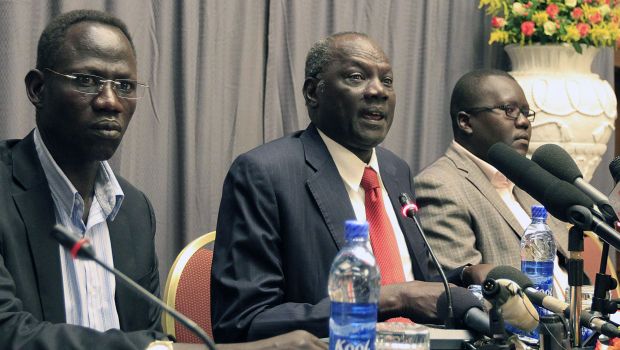
South Sudan Minister for Information and Broadcast, Michael Makuei (C) gives a press conference on January 5, 2013 alongside other delegation members in the Ethiopian capital a day after South Sudan’s warring parties met in Addis Ababa for the first time since fighting erupted three weeks ago (AFP PHOTO/Solan GIMECHU)
The direct talks, focused on a cease-fire and the release of political prisoners, put representatives of President Salva Kiir and former Vice President Riek Machar together in Ethiopia.
South Sudan has experienced three weeks of violence. Kiir says the violence began as a coup attempt Dec. 15, though Machar’s side denies the allegation. Violence began as a political dispute but has since taken on ethnic dimensions, with tribes attacking each other.
The UN has said at least 1,000 people have died. Some 200,000 people have been displaced by the fighting. Rebel forces loyal to Machar now control two state capitals, including the town of Bor, about 70 miles north of the capital, Juba.
Gunfire was heard in Juba Saturday night. South Sudan Information Minister Michael Makuei Lueth said Sunday that forces loyal to Machar instigated the violence but that it was soon brought under control.
Embassies, aid groups and the UN have sent personnel out of the country out of fear the fighting could engulf the capital as it did in the first couple days of violence. The US Embassy on Friday sent more personnel out of the country.
US Secretary of State John Kerry said Sunday the beginning of direct talks was an important step but that both sides need to put the interests of South Sudan above their own. The US played a big role in bringing decades of war in the region to an end. South Sudan peacefully broke away from Sudan in 2011.
“I think all of us feel a very personal stake in trying to avert tribal warfare and ethnic confrontation on the ground as well as any kind of resolution of political differences by force,” Kerry said in Jerusalem.
Kerry said the US will not support anyone who uses force to seize power, in an apparent message for Machar. The US has also called on the Kiir government to release political prisoners aligned with Machar so they can take part in talks.
South Sudan Information Minister Lueth on Sunday chafed at that suggestion, saying to release the political prisoners sets a bad precedent.
“We are not saying we won’t release them, but it will be done according to our laws,” he said.
Lueth also threatened to detain the widow of the man regarded as the father of the country, the late John Garang. Lueth said that the widow, Rebecca Nyandeng de Mabior, is spreading “negative propaganda.”
